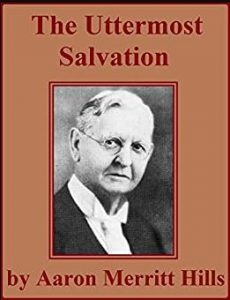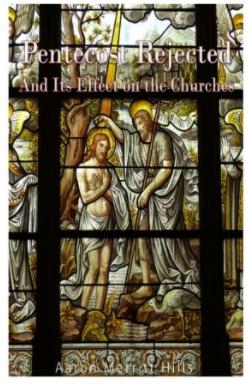Hills Aaron Pentecost Rejected explains how people reject the working of the Holy Spirit in their lives preferring their sinful ways instead.
Table of Contents of Hills Aaron Pentecost Rejected
Dedication
Preface
Chapter 1 Pentecost Rejected; and its effect on the churches
Pentecost Rejected; and its effect on the churches — Success of the Early Christian Church — Pentecost, the Reason for it — Early Decline from Neglect of Pentecost — History Repeats Itself — Much Light Now — Many are Hiding from it — Holiness Bands and Campmeetings — Papers and Magazines — The Holy Spirit now, Like Christ Himself, is Being Rejected — The Sad Signs of the Times — Government Statistics — Magazine Articles — Preaching of American pulpit — Verdict of the Bishops — Newspaper Articles — Year-books — Table of Statistics — A Needless barrenness — God’s Resources Still Ample — Success of my Theological Students — Theological Professors Generally are Ignoring the Supernatural — The Author a Friend of Education — But the Spirit-baptism is Most Important — Words of Joseph Parker — Greatest Preachers not College-bred — Let the Famine Come! — President Finney’s Verdict, and F. B. Meyer’s — The Five Conditions of Power — How Ought Pentecost to be Prized? — What it Would do for the Ministry and Churches
Chapter 2 The Denial of the Heart-cleansing Work of the Holy Ghost
The Denial of the Heart-cleansing Work of the Holy Ghost a Partial Rejection of Pentecost — Review of Torrey, Meyer, and Others — Those Who Belittle the Pentecostal Experience — Torrey’s Words — F. B. Meyer’s Assertion — H. W. Webb-Peploe’s Declaration — Prof. Agar Beet’s Opinion — Dr. Mudge, of Boston — All Five Deny Heart-cleansing as a Pentecostal Experience — Let the Word of God Decide it — Argument I, from Peter’s Speech before the Jerusalem Council (Acts 15:8- 9) — Adjective Katharos and Verbs derived from it — Brothers, Torrey, Meyer, and Mudge Questioned — Conclusion — Argument II, from Adjective Hagios — Its Meaning and Use — Various Texts — Are God and Angels Carnal? — Conclusion — Argument III, Meaning of Spiritual Circumcision — Something Removed, (Col. 2:9-11) — Ellicott and Meyer,the German Exegetes — Cremer and Daniel Steele — Conclusion — Torrey, Meyer, Webb-Peploe Questioned Again — Argument IV, from Rom. 6:6. — Adam Clarke — Meaning of Greek Word — Cremer — A Flat Contradiction between Jeremiah and St. Paul and Torrey, Meyer, etc. — The Unfortunate Substitution — Conclusion — Argument V, Verbs might have been chosen that would have taught Suppression — Highly Proper for Torrey and Meyer to Explain why They were notChosen — Meyer gives away his Own Position — Conclusion — Argument VI, I Cor. 1:1-2, and Eph. 4:11-13 — Conclusion — Argument VII, I John 1:6-10 — Explanation of the Famous Passage — Meyer’s Perversion of Scripture — Hear from the Scholars, Westcott, Alford, Adam Clarke — Argument VIII, I John 3:3, 5, 7 — Adam Clarke’s Comment — Bishop Westcott and Dean Alford Contradict F. B. Meyer, also Steele and Bishop Ellicott — Repression not in the Book — Argument IX, from the Meaning of Baptize — Water and Fire Purifying Elements — Steele’s View — McLaughlin’s View — What a Clean Heart Means — Two Remarkable Passages in Old Text, which the Torrey-Meyer Theory could not explain — Human Philosophy Teaches the Same — Four Arguments — The Conclusion against the “Suppression Theory ” is Irresistible — Sorry to Criticize these Brothers — Debt of Gratitude — Teaching in Torrey’s School — “Damnable Heresy!” — John Wesley, John Fletcher, Adam Clarke, Bishop William Taylor, and Catharine Booth the Sad Victims of it! — Effect on the Moody Institute — Moody
Chapter 3 What this Pentecostal Blessing is which People are Rejecting, and how it may be Obtained
What this Pentecostal Blessing is which People are Rejecting, and how it may be Obtained — A Good Thing to “Know” — Meaning of “the Old Man” — Scripture Names for Him -Awful to keep such an Enemy in the Heart — Dangerous to Piety — I. Holiness Defined — II. Why we ought to have it: Six Urgent Reasons — III. How it is obtained — Conditions Explained — Quotations from “A Clean Heart”
Chapter 4 Pentecost Received Results in Walking with God and Separation from the World
Pentecost Received Results in Walking with God and Separation from the World — God’s Word on the Subject — I. God wants us to walk with Him — II. We can do it — III. Must walk where God walks — IV. Must be in Harmony with God — V. God requires Separation: I. In Business; 2. In Marriage; 3. In Many Secret Societies. — Moody’s View — John Quincy
Download
Download “Hills-Pentecost-Rejected.gbk_.twm”
Hills-Pentecost-Rejected.gbk_.twm – Downloaded 11 times – 94.00 KBAaron Merritt Hills (1848–1935).

Church of the Nazarene theologian. Educated at Oberlin College and the Yale Divinity School, Hills was for twenty years the pastor of Congregational churches at Ravenna, Ohio; Pittsburgh, Pennsylvania; and Springfield, Missouri. At Oberlin, Hills became greatly interested in Christian holiness through the influence of Charles G. Finney and during his later pastorates increasingly identified with the Holiness Movement. He labored for several years as an evangelist and during this period professed the Holiness Movement’s cardinal experience of “entire sanctification.”
Hills was subsequently founding president of three Wesleyan-Holiness colleges: Texas Holiness University (Greenville, Texas), now part of Southern Nazarene University (Bethany, Oklahoma); Central Holiness College in Iowa; and Illinois (now Olivet) Nazarene University. He also taught theology at Asbury College and Bethany Nazarene College but was associated longest with Pasadena College (Nazarene) in California, where he taught from 1916 until 1932. Hills wrote nearly thirty books, including biographies of leaders in the Holiness and temperance reform movements. The most notable are Holiness and Power (1897), a widely influential book in the Holiness Movement of its day, and Fundamental Christian Theology, 2 vols. (1931), the first Nazarene systematic theology.
Bibliography. A. M. Hills, Collection of the Nazarene Archives; Herald of Holiness (July 2, 1951):4.
- S. Ingersol
Source: Dictionary of Christianity in America
Works by Aaron Merritt Hills
- Life of Charles Finney
- Holiness and Power
- Establishing Grace
- Dying to Live
- Phineas F. Bresee: A Life Sketch
- Life and Labors of Mrs Mary A. Woodbridge
- Food for Lambs
- A hero of Faith and Prayer: Life of Rev. M. W. Knapp
- Pentecostal Light and The Whosoever Gospel
- Backslidders and Worldly Christians
- Fundamental Christian Theology
- The Uttermost Salvation
- Collected Works: 12 in one
- The Secret of Spiritual Power
theWord Modules by Aaron Merritt Hills
[catlist tags="aaron-hills" numberposts=7 pagination=yes instance=1]
More Works on the Baptism of the Holy Spirit
[catlist name=”baptism-of-the-holy-spirit” numberposts=7 pagination=yes instance=85]
Works on Revival
[catlist name=”revival” numberposts=7 pagination=yes instance=87]
